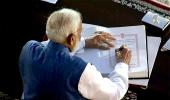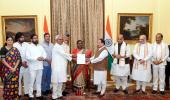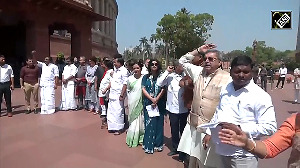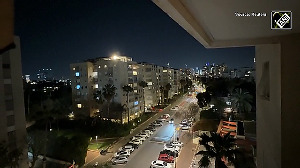'The word 'ally' in a coalition is misleading because it suggests someone who is always for you and with you. This is incorrect.'
'They are always for themselves and sometimes with you,' explains Aakar Patel.

The prime minister spoke to the NDA allies in Central Hall just before his swearing in.
His message was that he would remain prime minister for another ten years (he did not say how he knew this) but to be fair to him that was mentioned in passing.
His main message appeared to be to tell his alliance not to pay attention to the news.
Things would be reported about their government from here on but alliance partners should ignore these reports and not trust anything without it being verified.
Why would he say that? Of course because things will begin to be reported in a way that they were not reported in the last decade.
We have just come out of an era of total secrecy.
Modi's own Cabinet ministers did not know that demonetisation was coming.
We know this because it was reported later that the Cabinet had been summoned to the meeting a few hours before Modi's speech to authorise demonetisation but ministers were told to leave their phones behind. This was to stop them from relaying the news outside.
Since the ministers did not know till that moment, their ministries did not know or prepare.
A similar situation had arisen during the 2020 national lockdown which came as a bolt from the blue to all of us including those in government.
This sort of thing will no longer happen. Alliance partners shift from collective Cabinet responsibility to one individual has ended and the shift back has begun. This is a good thing.
There is a reason media speculation happens in democracies. That it shows a free press which can speculate about those in power without fear is only one aspect.
The other is that things that are said behind closed doors, or cannot be said at all, are floated by people inside to gain advantage.
This is normal in all democracies. It is in authoritarian places where there is no knowledge and no speculation about the goings-on.
Where there is fear of being surveilled and danger of being punished for speaking.
We should therefore expect such a change to come over at least one part of the media and the prime minister recognises this.
What is less certain is why he would think his allies would not listen, because, of course, they will listen to what concerns them.

Modi has an advantage over alliances of the sort that began just after P V Narasimha Rao's government fell.
And that advantage is that he has 240 MPs. His predecessor as NDA leader, three time prime minister Atal Bihari Vajpayee, had only 180 MPs in his last term.
That meant more vulnerability to allies to the point where the alliance itself was becoming the news.
There was a fascinating report in February 1999 about Vajpayee sending then defence minister George Fernandes to assuage AIADMK leader and NDA partner Jayalalitha.
Fernandes flew to Chennai to her Poes Garden residence with the BJP's Pramod Mahajan, after he was given an appointment. But they were not given an audience.
Instead, Jayalalitha admonished Fernandes over the intercom and they left.
Another news story from November 2001, headlined 'Mamata sulks over PM refusal for Cabinet berth', reported how the TMC boycotted a Cabinet meeting after joining the NDA.
The BJP's then president, Jana Krishnamurthy, said, 'How can somebody expect to become a minister immediately? There are our own MPs aspiring to be ministers and they have been waiting for quite a while.'
The reference was to two BJP Lok Sabha MPs from Delhi -- Madan Lal Khurana and Sahib Singh Verma -- who had been waiting for ministerships and they were also sulking.
This is what alliances are about and that is what they have always been about. The last decade was an aberration in India's politics of give-and-take.
Vajpayee was a pragmatist and a politician of the old school, willing to accept the discomfort and irritation and occasional humiliation.
Though he had fewer numbers he held this advantage over Modi, who is authoritarian by nature (I know him personally and can attest to this), and will have to learn how to compromise.
Modi hopefully will not be put in such a position as frequently as Vajpayee was, given his larger plurality of seats but there will be moments when what has happened over the last decade from 2014 to 2024 will not happen.
When his will to impose something over the heads of his Cabinet will be tested.
We can be absolutely sure that this will be reported because the allies, or people inside the BJP looking to assert themselves, will want it reported.
Telling people to ignore the news will not work.

The word 'ally' in a coalition is misleading because it suggests someone who is always for you and with you. This is incorrect.
They are always for themselves and sometimes with you.
In perfect partnerships such moments of difference do not come. But that happens only in the realm of fairy tales and divine beings.
For us mortals, the world is a real place and its unpleasant realities have to be engaged with, not ignored, because they absolutely will come up.
For those who write, report and consume the news this will be an interesting and fascinating and often entertaining five years.
Aakar Patel is a columnist and writer and you can read Aakar's earlier columns here.
Feature Presentation: Aslam Hunani/Rediff.com











 © 2025
© 2025